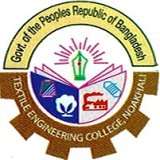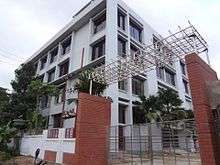Begumgonj Textile Engineering College, Noakhali
|
টেক্সটাইল ইঞ্জিনিয়ারিং কলেজ, বেগমগঞ্জ, নোয়াখালী | |
 | |
| Motto | "Textile Means Developing & Prosperity" |
|---|---|
| Type | Public |
| Established | 2006 |
Academic affiliation | Bangladesh University of Textiles (BUTEX) |
| Principal | Engineer A.K.M. Fozlul Haque |
Administrative staff | Around 70 |
| Students | 480 |
| Undergraduates | 480 |
| Location | Noakhali, Chittagong, Bangladesh |
| Nickname | TECN |
| Website |
tecn |
Textile Engineering College, Begumgonj, Noakhali (Bengali: টেক্সটাইল ইঞ্জিনিয়ারিং কলেজ, বেগমগঞ্জ, নোয়াখালী) is an engineering educational institute in Noakhali, Chittagong, Bangladesh. It is affiliated with Bangladesh University of Textiles (BUTEX). It is one of the six textile engineering colleges which are directly controlled by Ministry of Textiles & Jute, Bangladesh.
History
During the British colonial rule from 1911 to 1929, 33 peripatetic weaving schools were established in East Bengal to meet the requirements for a textile technician by offering an artisan-level six-month course. Begumgonj Textile Engineering College, Noakhali is one of them; it was established in 1918. In 1968 it was upgraded to District Weaving School offering a one-year course and in 1981 District Textile Institute offering a two-year certificate course in textile technology. But the certificate course was not acceptable to the industry.
In 1993 a three-year diploma course was introduced under Bangladesh Technical Education Board (BTEB) which was treated as a milestone for the textile education. The duration of this course was extended to four years in 2001.
The college was upgraded in 2007 to offer a BSc in textile engineering. The course is affiliated by the Bangladesh University of Textiles (BUTEX).
Curriculum

College offers following BSc in Textile Engineering programs under the Bangladesh University of Textiles (BUTEX).
- BSc in Textile Engineering (Yarn)
- BSc in Textile Engineering (Fabric)
- BSc in Textile Engineering (Wet Process)
- BSc in Textile Engineering (Apparel)
| First Year | Second Year |
|---|---|
The first-year syllabus consists of pure science in addition to some basic concepts of Textile Engineering.
|
From second year and onwards, students acquire a wide range of theoretical and practical knowledge in the area of Textile Technology and Engineering which equip them for future employment. Subject offered in second year:
|
| Third Year | Fourth Year |
|---|---|
Subjects offered in third year:
|
In the fourth or final year students have to choose a group of subjects for specialization. Subjects offered in fourth year:
|
Total credits: 144
Career prospects
The majority of textile graduates take up posts in the textile manufacturing industry as process or plant managers and development engineers etc. Recent graduates have found employment in the areas of production management, design, textile testing and quality assurance,merchandising, new product development, buying house, commercial banks, customs etc.
See also
External links
Coordinates: 22°56′34″N 91°06′20″E / 22.942645°N 91.105499°E